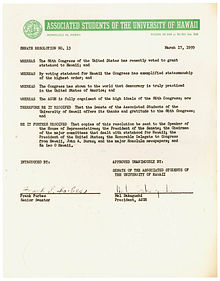Associated Students of the University of Hawaii
ASUH was chartered by the University of Hawaiʻi Board of Regents in 1912[1] and was originally named the Associated Students of the College of Hawai'i.
The student government manages a stock portfolio currently worth around $9.0 million, of which up to 5 percent is withdrawn annually to fund the senate's yearly budget.
Before the construction of the Campus Center, the ASUH office was located in Hemenway Hall along with the University's cafeteria, mail room, and bookstore.
Special Elections may take place during the Fall and Spring semesters to fill any vacancies that occur in the senate throughout the year.
[4] Current chairs KTUH, the student run radio station at the University of Hawaiʻi at Mānoa, began as a standing committee of ASUH in 1966.
On September 28, 1967, ASUH passed a resolution asking UH President Thomas Hamilton to apply for an FM educational license.
On January 8, 1969, the Board of Regents authorized the administration to file for a 10 watt FM radio station.
[7] The purpose of the ‘Ōlelo Hawai‘i Initiative is to provide an opportunity and space for UHM students and community members to learn and speak the Hawaiian language at a centralized location on the Mānoa Campus.
[8] At that time, the U-PASS was an optional $100 per semester a student could choose to pay if they wanted a bus pass.
[11] This project was a collaborative effort between the Associated Students of the University of Hawaii (ASUH) and the Campus Center Board (CCB).
[15] Students and student leaders also successfully led efforts to triple the amount of undergraduate academic advisors after submitting hundreds of pieces of testimony in support of robust funding to address desperately needed advising positions.
In 2006, an emergency hold off on non-emergency advising was issued during the first two weeks of the semester due to a staff shortage with over 100 students a day being turned away.
In 2006, ASUH successfully led the effort against Lieutenant Governor Duke Aiona in order to preserve alcohol sales at Aloha Stadium.
The ASUH Senate voted unanimously to oppose the proposed alcohol ban in both the Aloha Stadium parking lot and seating areas.
[17] Grant Teichman, a junior at the university and president of the student association, said the ban would infringe on the rights of those who can legally drink.
[19] In 2006, ASUH began a high-profile advocacy initiative in support of the Honolulu High-Capacity Transit Corridor Project.
[20] Mayor Hannemann later lost ASUH support after his decision to remove the University of Hawaiʻi at Mānoa campus from the proposed initial operating 21-mile segment of rail.
While construction on the new Frear Hall was completed in 2008,[25] it has already fallen into disrepair due to many of the same management issues plaguing UH student housing for decades.
[26] ASUH also spearheaded a comprehensive management audit for University of Hawaii Student Housing Services enacted by S.C.R.
[31][32][33] The ASUH recognized that the lack of parking stalls on the University of Hawaiʻi at Mānoa campus was a great concern to undergraduates.
In order to alleviate the parking shortage, ASUH Senator Paul Isono created a pilot shuttle program in the fall of 1990.
In May 1970, ASUH called for a week-long strike to protest the Vietnam War and America's bombing of Cambodia.
The Leeward Community College student and faculty senates both voted to set aside May 11–16, 1970 as "a special week for consideration of U.S. involvement in Southeast Asia."
University of Hawai'i President Harlan Cleveland directed that no one be failed or given a lower grade for being on strike, since students "have the right to absent themselves on a matter of conscience.
Notable speakers include, Martin Luther King Jr., James Farmer, Robert Simmons of the Louisiana White Citizens Council, Communist Party boss Gus Hall, and American Nazi fuhrer George Lincoln Rockwell.
Student delegates attended a mock convention two years later to draft a "model" state constitution.
ASUH and the student body contributed $12,000 while faculty, alumn, and the Women's Campus Club gave $10,000.
